Latest Contributions
Read More Contributions
Memories of pre-1947 Kohat and a visit in 2004
Category:
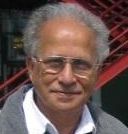 I was born in Kohat, now in Pakistan. After partition, my family migrated to Delhi. After my B.E. (Civil) Engineering degree in 1962 from University Of Roorkee, I worked as an engineer in UP’s Irrigation department, and retired as a Superintending Engineer. Now I live in Saket, New Delhi and am the President of M-Block (NE) Saket Cultural and Niwasi Welfare Association, New Delhi. I also served as honorary secretary of the Association for 4 years. It is my endeavour to serve humanity at grass root level.
I was born in Kohat, now in Pakistan. After partition, my family migrated to Delhi. After my B.E. (Civil) Engineering degree in 1962 from University Of Roorkee, I worked as an engineer in UP’s Irrigation department, and retired as a Superintending Engineer. Now I live in Saket, New Delhi and am the President of M-Block (NE) Saket Cultural and Niwasi Welfare Association, New Delhi. I also served as honorary secretary of the Association for 4 years. It is my endeavour to serve humanity at grass root level.Editor's note: If you have photos of pre-1947 Kohat, please send them to us at indiaofthepast@gmail.com. We would like to include them after the story.
The city
Let us start with conditions prevailing before India's Partition - starting from the year 1945 or so.
I used to take my bath in a Katha (a waterfall) at the foothill of a mountain range (do not remember the name) near Kohat in Peshawar district, now in Pakistan. It was a place where water came flowing down the hills. The water used to be so crystal clear that you could find out a dhela (a coin lesser in value than a paisa) at the riverbed. There were two parts to these Kathas: one for gents, and the other for ladies. There used to be a partition or sheet of cloth hung in between the two parts.
As it was a hilly area, there were no convenient means of communications or transport. People used to carry their luggage on the back of donkeys or Khachars (a mule-like animal, very sturdy in carrying heavy loads). The local Pathans used to have khachars and donkeys for their daily routines.
Kohat city was surrounded by berry trees. There were dry fruits in abundance. We used to eat nejas, kajus (cashews), akhrots (walnuts), peanuts and badams (almonds). Bhutas (corn) were also very common. There used to kurkhas (red beans) sold in the market after boiling as chholas on the streets. They used to prepare tasty tikkies - adding salt, chillies, and nimboos (limes).
I remember a shop on the corner of our street where Katlamas were made during Dashera\; these are eaten with mango pickle. The gajar ka halwa (carrot halwa) was tasty.
There was only one bazar, and it had big gates at the two ends of the bazar. One gate was called the Sher Darwaza. There used to be a police station on one gate. I used go to the hardware shop of my father in this bazar. The shops had their doors in shape of wooden pieces stacked horizontally on the door opening when closing the shop, and vice versa.
There was no electricity. People used to burn kerosene oil in lamps and lanterns. The food was cooked in chulhas fired by wooden planks, and rotis were prepared in tandoors fired by wooden planks, usually in one common tandoor (sanja tandoor) as a community to save wood.
There used to be one well deep enough in the mohallas and katras for water, which was pure and potable. This well used to be cleaned once in a month by pouring potassium permanganate into it.
The bazars contained meat shops, with hanging goat meat, which I did not like. Moreover, it gave a bad smell and there were big flies hovering around. I remembered that once I was playing, and passed from the lane, I saw Muslim bhai butchering a bater (quail). What he was doing is still clear in mind that. He was catching hold of the neck of the bird, and just twisting and throwing it on the ground bleeding. Likewise, one day I saw cocks being butchered by cutting their necks with a knife.
On seeing these scenes, I used to hate this cruelty to animals. This was the reason that we all were vegetarians. Mostly the Hindus used to be vegetarian as the religion teaches us to have pity on all the animals and birds. Even we use to feed ants and birds, as they are also the creations of God. When we cannot give life to anybody as such, we got no right to kill any creature. I think this ideology of our religion is good.
All the communities - Hindus, Sikhs, Pathans, and Muslims - used to keep buffaloes, cows, goats etc for their need of milk, ghee, curd etc.
You would find other shops of cloth, vegetables, hardware and paint, halwais, shops of hot seekh kabab, and restaurants serving all types non-vegetarian stuff and tandoori rotis. You could also find horse tangas in the bazar. The gates at the both end of the market used to be closed after 10 pm, with a policeman on duty for safety.
There were gallies (narrow lanes) of all communities, and at both sides of these streets, there were dirty drains. Likewise, the roads of the bazar had drains, which usually remained dirty. There were sweepers, but they seldom cleaned\; when they did, they washed the streets with the help of water carried on their backs. I still remember black silt being removed from those drains, and stacked along the length of those drains.
There was a shortage of water. There were masonry wells all over in the city, and water was pulled out of these wells by lifting buckets tied with ropes. At the end of every lane, there used be a koora dan (garbage bin).
Being a hilly area, there used to be dirt on the roads. Sometimes, I noticed tankers of water in the market sprinkling water on the roads and gallies to subside the dust. As a rule, all the shopkeepers used to clean the front portion of their shops and throw water to subside the dust.
At my school there used to be a small canal having fresh water, which might had been connected with Kathas (water stream) flowing near foot hills of the mountains.
Most of Muslims and Pathans used to keep birds as pets. I saw teetar (partridge) and murga (cock) fights. Baters (quails) were also kept as pet birds. All the people enjoyed, and there used be so many parties taking part in these games. The winners got prizes and money.
Another game people used to enjoy was pigeon Kabuter Bazi (pigeon flying). Kite flying was also very common.
I remember there were camels, which were used as the means of transportation. Sometimes you could see bullock carts.
The houses were mostly of mud. At night, we were advised to be away from walls so that the scorpions may not bite. If any scorpion did bite someone, the people used to rub metal or the record player disc of gramophone on the wound.
The schools were very far off. We used to go the school either on donkey or on foot. I saw a bicycle for the first time in year 1947. I believe it was Hercules or BSA make.
The communities
Most of the businesses were run by Hindus. The native Pathans use to invade Hindu mohallas whenever they are short of rations or other needs. Some of these Pathans would set our houses on fire and/or loot the families. I remember one meeting was organised by the Hindu and Sikh families to safeguard the Mohallas. One morcha was built at the top of a building, and volunteers used to sit the whole night with guns to scare away the Pathans.
The Pathans were very sturdy. They used to wear long Kamiz (shirt), Salwars, Pagris, and Kullas (just like a cap), and Kheries (Peshawari sandals). They use to cut trees or do hard work for their living.
The Pathans were scary, as I was told in those days that they would kidnap boys. They used to live in tribes usually outside towns. They use to keep goats, sheep, and dumbas (male sheep). The Pathans used to live in tribes under one Sardar (head). The Sardar used to have several Nadas, young boys who were personal servants of the sardar). Here I tell you that in their local language, the male child is called nada, and the female child is called nadi. The Pathans use to manufacture knives, and small weapons such as gupties, belchas, chhuries and nezas etc.
One thing positive about the Pathans was that they respected their ladies. They also respected their word.
The local language of the Pathans was Pashto. It was so cold that the Pathans used to take a bath after several days. Muslim ladies used to wear Burqa, and were not allowed to go to school. At Kohat, the Muslims and Hindus/Sikhs used to live together in friendly neighbourhood, and they used to celebrate the festivals of each community. It was a good thing.
When it comes to greetings, I remember people used to talk in this way:
For Muslims
Kya hall hai khan sahib? How are you, Khan Sahib?
Khuda di maher hai or Khuda Ki Maher hai. God has bestowed blessings
For Hindus
Kya hall hai Mahashiaji? How are you, Mahashia ji?
Ishwar the Kirpa hai. God has blessings on us.
For Sikhs
Kya hall hai sardar sahib? How are you, Sardar Sahib?
Waye Guru di maher hai. Guru Nanak Dev ji's blessing on us
My family
We were living in a house in an ahahata (Colony or compound) belonging to Ramjwai, our landlady. It was opposite to Arya Samaj Wali Gali. All Hindus used to live in groups in Hindu mohallas (neighbourhoods), for protection.
My father, whom we used to call as Bauji, had many friends who were Muslims and Pathans. Bauji, an honest man, was Pradhan (head) of the local Arya Samaj. He knew Urdu and Pashto. He was respectfully called Mahashia ji.
My father was a man of great willpower. He hated smoking, and never touched a cigarette. One day, one Pathan friend tried to force him to smoke\; he threatened my father that he would face the gun if he did not smoke. My father stood in front of him and ordered the Pathan to shoot him, but he would not yield. Such was his mental strength and willpower. I am proud of my Bauji, and pay my sincere Shraddhanjali to him in Heaven.
He used to inculcate the habit of hard work in us. I remember one of his shers (a couplet in a ghazal):
Mahnet Karo Azizo, Mahnet Se Kam Hoga My beloveds you should do hard work, hard work will change your destiny
Kahente hain, Jaisse Waqt aa kar Gulam Hoga They say even time can be your slave
In other words, work is the essence of success, and even time can be enslaved due to hard labour.
My father used to teach us good teachings in a simple way as. For example,
Wand Khadi kheer khand khadi (whatever you possess, you should distribute among yourselves and it will taste sweet like kheer and sugar)
Chori Khad te Ghori Khadi (If anybody eats anything stealthily, it would be like meat of ghori (mare).
When he was in a good mood, he used to narrate some Farsi-Urdu poems, such as
Didam pey tum tumera shakse charida buda
Sirr pur thi uske pagri munche kharida buda
Puchha jo main ne us se jate kider ho sahib
Usne kaha chhup raho ji shaid kuch ranjida
Main bhi tha dhid pucca khara na uska chhora
Dora jo wahan se badro thi uske agey
Gira wo usme moan sur phatida buda
I saw a man riding on Tonga horse cart who was wearing a turban and his moustaches were standing erect. I asked him where he was going\; to this replied, "shut up." I thought he was not in mood to reply due some stress. So he started to run but I was bent upon to get reply as such I also started running after him. Accidentally, he fell in the river and got injured on his face and mouth.
My father had a good command of English. Sometimes, he would recite poems such as
● King George, the emperor of Hind from Kamran to Sind
● One thing at time, and that done well is a golden rule many can tell
Once my Bauji was very tense, I heard him saying something like:
Sir pur gire pahar to fariad kya kare? If the hill falls on your head, then why ask for mercy?
Saman So burs ka pal ki khabir nahe. Wealth collected over a long time can be destroyed in the shortest time
He also sang nursery rhymes such as Twinkle twinkle little star.
He advised me that whenever I faced any problem, I should utter the Gayatri Mantras. Further, whenever I felt rage, I should drink one glass of water, and think over the problem. He believed that when taking decisions one should take the opinion of others\; he used to say if there is a khota (donkey) nearby, one should take the opinion of donkey. It means that while deciding anything one should take the advice of his friends.
All these sayings imply that you should look before you leap, and you should think before you speak. One should be honest to all, specially to oneself, and should hear the inner voice.
My mother used to sing
Meri patian te likh de jai gopal
This was a song devoted to Shri Krishana, the lord. This may be why she named me as Jai Gopal. It may be her inner wish that I should do good work\; that's why I am writing these memories.
In my childhood, my brother, sisters, and I used to play together. Girls used to study only at homes and there were no schools for girls. The girls used to learn Hindi in Arya Samaj Temples, and boys were supposed to learn Urdu in schools.
I still remember my school, where I used to study Urdu. In my school basta (bag) there was one Quada, slate, Takhti, Kalam dawat, and black ink (Sahai).We used to write the Urdu alphabet Alaf, Bey, Paye, Taye ,Saye and learn the numbers, multiplication (Zarab), division (Taksim), addition (Jama), etc. Irony of fate is that I completely forgot all that I had learnt!
Our teacher's name was Buta Ram. He was very strict, and used to thrash anyone who forgot the lessons. There was a school near the hill where I studied in class 2 and our daily duty was to learn our lessons in Urdu and arithmetic. Our teacher used to give homework such as learning and put up to submit the complete homework the next day. We used to sit on floor and replied to the roll call, and used to say hazir janab (present, sir). Then comes the time to show the homework and verbally the tables etc. Then if we forget and there was any mistake found, the teachers used to punish.
The command came as murga ban jao meaning thereby that one should bend on his knees and take his hands from the knees and hold both the ears. As we have to bend forward, we should not fall so slate or wooden plate like piece is put on the back and time was unlimited till tears used to come. If the plate or wooden sheet fell down, then the punishment was repeated. This punishment was torture in name of education - it was too harsh on the students.
The teacher would taunt some students like this:
Zamin gunmbad pe gunmbad
Gul Mohammad Gul Mohammad
meaning that the Earth is revolving and revolving but Gul Mohammad is still in the same class, while his fellow students had been promoted to next class.
During my childhood, for the Lohri festival, the children used to go around asking for some grains, corn seeds, and raveri etc. We used to sing:
De Mei De Kale Kute Nu De
Kala Kuta De Dam\\Wan Tere Jivan Muji Gayin
Gayin Mara Pud Meiye Do Seir Dane Kud
When any family refused to give us something, we used to sing:
Huka Beyi Huka Aei Ghar Bhuka
During the Lohri festival, children, men and ladies used to sing many songs. One of the popular songs was:
Sundri mundri aye ho tera koan vichara ho dula bhati wala ho,
Dule dhi vayei ho saer shakar paei ho
I remember another poem we used to sing on Lohri festival while collecting something for the festival door to door. Some of the lines are:
Jhule Ni Maye Jhule do jhul piayn khajuran Khajuran satta meva is koori de ghar mangeva is ghar de koori nikhri bhar bhar khandi churi
Lohi Lohi Takee Phichhe Chhup Khloi Takee Mara Pud Bibi Do Seir Dane Kud
Let us go in the kitchen. There were no modern facilities available in those days. We had just earthen pots, handia (aluminium utensils), and some degchi, thalies, katoris, and spoons. The hearth was of six bricks stacked in the square with one side open. Firing this chulha was a tough job. My mother used to blow air from her mouth so that the wood could catch fire. After the food was ready, we all sisters and brothers sat around the chulha, and took the food in the kitchen. It was the duty all to wash hands before entering in the kitchen sit and remember the god before taking first loaf of roti.
With the dedication of our mother, we all were brought up and were happy. Here I have become emotional and pay a Shraddhanjali to my mother\; may God give her peace in Heaven.
Some of our neighbours were Dalchand, Sohan Lal Mistry and his sons, comrade Shri Ram Kumar Sham, Shri Bodh Raj Bhaiyaji, our Manohar Lal Bhapaji, and our Tayaji's family in the upstairs house. My sincere heartfelt Shraddhanjali to those pious souls, who are resting in peace in heaven. But one thing was great: in spite poverty, all were so friendly among all sections of society.
Demand for independence
In the years 1945 to 1947, there was great enthusiasm of freedom. There were slogans such as Todi Bacha Hai Hai, and Angrezo hamare watan ko chhor jao (English people, leave our country). I remember a party of Sarhadi (Frontier) Gandhi (Khan Abdul Ghaffar Khan), which was called the Khaksar Party, and its volunteers were called Khudai Khidmatgar. They used to parade in the market with belchas (shovels) on their shoulders.
The janooni of azaadi (freedom) was much hyped. Even the British could not control the tribes. Once, for certain demands, some Pathans took as hostage the wife of the Collector but returned her quite safe and sound when their demands were met\; as I wrote above, they respected their words and ladies.
_______________________________________________________________
© Jai Gopal Sethi 2013
My parents' visit to Kohat - nearly 60 years later
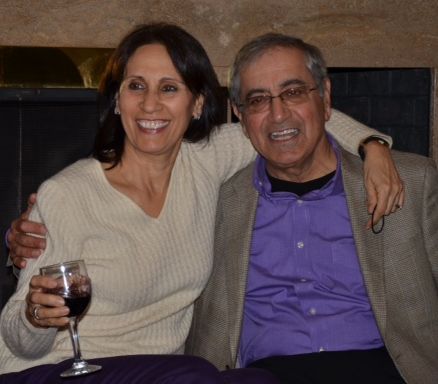 Anand Seth, seen here with is wife Savita, was born in Kohat in 1945, only to leave at partition. Family moved from Delhi to Ajmer to settle in Jaipur. Went overseas after IIT Delhi only to come back to get married in 1972. After a long career at the World Bank, retired in 2007. Visited Kohat in 2004 with family. Set up EduGIRLS charity to help educate girls living in poverty, now looking for a girls’ school in Kohat.
Anand Seth, seen here with is wife Savita, was born in Kohat in 1945, only to leave at partition. Family moved from Delhi to Ajmer to settle in Jaipur. Went overseas after IIT Delhi only to come back to get married in 1972. After a long career at the World Bank, retired in 2007. Visited Kohat in 2004 with family. Set up EduGIRLS charity to help educate girls living in poverty, now looking for a girls’ school in Kohat.Editor's note: This story came about when Mr. Seth read Mr. Sethi's story about Kohat. I have posted it here, even though the visit did not take place 50 years ago, as required by the website's rules, because it is almost a follow-up to Mr. Sethi's story, which meets the 50-year-ago rule.
I was born in a Hindu family in Kohat in 1945\; we left Kohat during the Partition. No memories, but I was able to go back in 2004 with my father and mother, wife and brother and son. We were received so warmly! My mother said that nothing had changed...recognized every landmark! I have some lovely photos. I am now trying to locate the girls school in the Hindu Mohalla where my mother and my aunts studied to see what we can do to strengthen its services to the girls of Kohat.
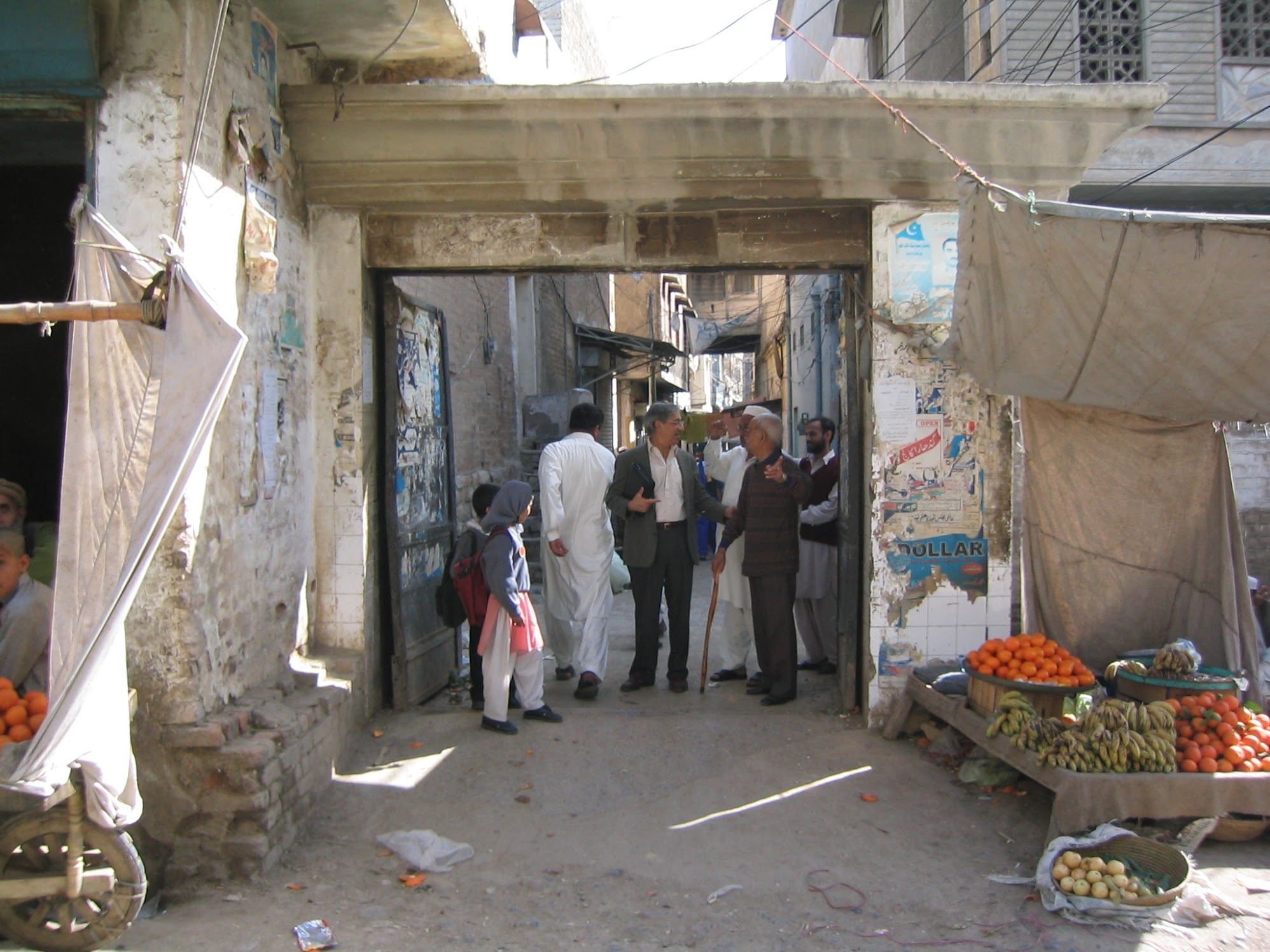
My father Seth Parmaa Nand with me at Sher Darwaza. Kohat. 2004.
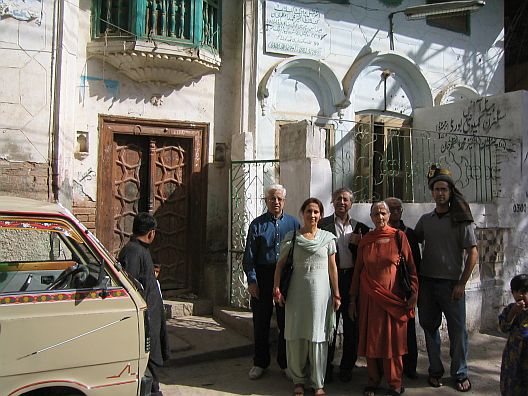
My mother at her old family home with the same front door!
From L to R my brother Vinod, my wife Savita, me, my father Seth Parma Nand, my mother Bimla Devi and my son Gorav . Kohat. 2004.
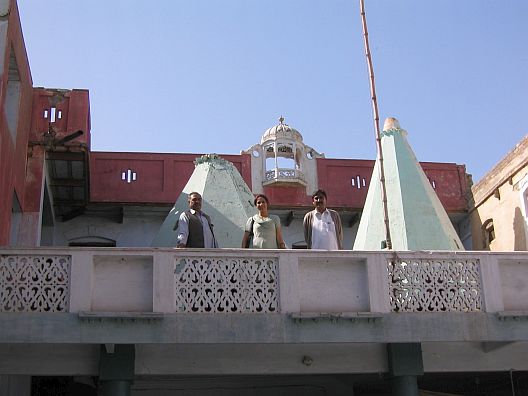
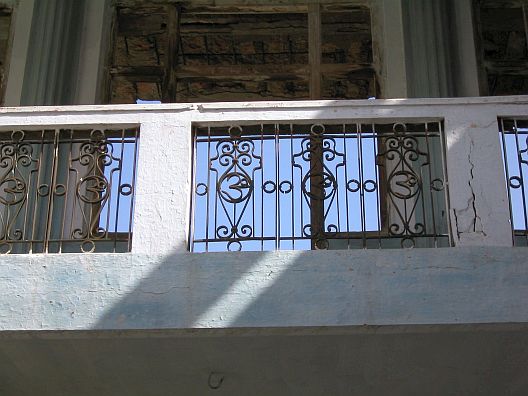
My wife at the Temple (picture above), now a school, with the OM symbol still intact in the ironwork with local residents. Kohat. 2004
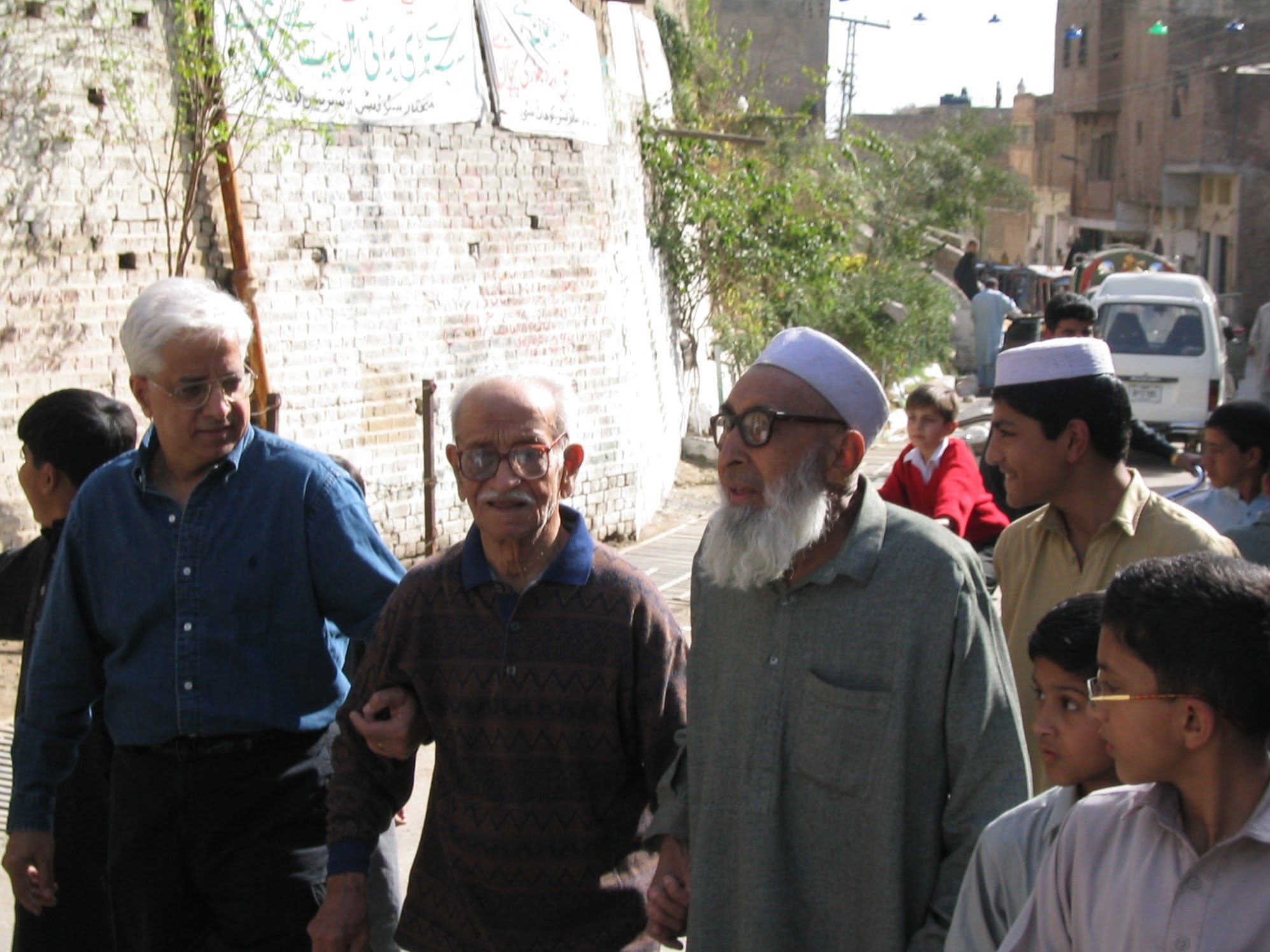
My father Seth Parma Nand (center) and brother Vinod (Left) being greeted: did he find an old friend? Kohat. 2004
_______________________________________
© Anand Seth 2018
Editor's note: Mr. Seth is keen to be in touch with interested people living in Kohat now, or from Kohat. Please add a comment below reply if you are interested.
Comments
Pages
Add new comment